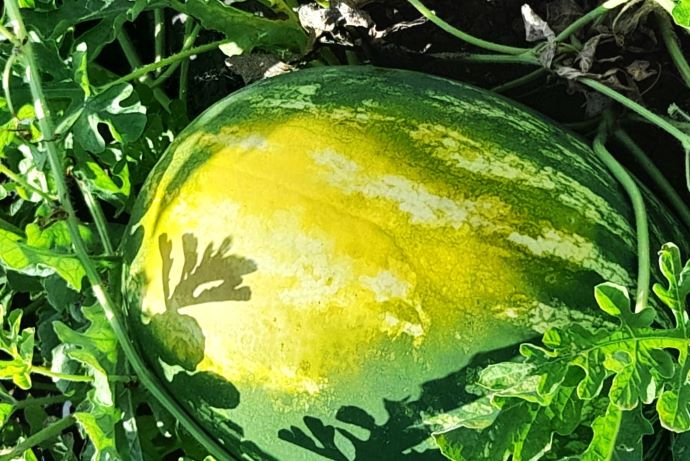 The torrid heat is ” burning” the fruit and vegetables in the fields with burns that cause the loss of the crop which in some companies reaches 90%, from peppers to melons, from watermelons to grapes, from tomatoes to aubergines. This is the alarm raised by Coldiretti Puglia, in relation to the wave of heat that invests the countryside and stables, with farmers trying to run for cover by shading the products, even through grass and leaves as natural barriers. Heat burns irreversibly damage fruit and vegetables, to the point of making them unsellable. We try to anticipate the harvest when possible – continues Coldiretti Puglia– the fruits on the trees are thinned out, eliminating those that are not able to ripen, to try to save at least part of the production. But the torrid heat also hinders the agronomic and harvesting operations which must be suspended in the hottest hours to protect the health of the workers while it becomes impossible to work in the greenhouses.
The torrid heat is ” burning” the fruit and vegetables in the fields with burns that cause the loss of the crop which in some companies reaches 90%, from peppers to melons, from watermelons to grapes, from tomatoes to aubergines. This is the alarm raised by Coldiretti Puglia, in relation to the wave of heat that invests the countryside and stables, with farmers trying to run for cover by shading the products, even through grass and leaves as natural barriers. Heat burns irreversibly damage fruit and vegetables, to the point of making them unsellable. We try to anticipate the harvest when possible – continues Coldiretti Puglia– the fruits on the trees are thinned out, eliminating those that are not able to ripen, to try to save at least part of the production. But the torrid heat also hinders the agronomic and harvesting operations which must be suspended in the hottest hours to protect the health of the workers while it becomes impossible to work in the greenhouses.
The African heat of these days also cuts the production of eggs, milk and honey. The bees exhausted by the heat have stopped flying and no longer carry out the precious work of transporting nectar and pollen . With the thermometer above 40 degrees there are strong repercussions with milk production down by more than 15% for the cows in the stables , while fans and cooling showers are running at full speed in the stables to save the cows which, due to the heat, eat little, drink a lot up to 140 liters of water a day against 70 in normal periods and produce less since for them the ideal climate is between 22 and 24 degrees.
With the high temperatures – specifies Coldiretti Puglia – there are also crops in the countryside in danger where farmers are forced to resort to emergency irrigation to save crops suffering from high temperatures , from vegetables to oats, from wheat to tomatoes because with temperatures above 35 degrees even plants are at risk of heat strokes and water stress which compromise the growth of fruit on trees, burn vegetables and damage cereals.
The African heat wave – underlines Coldiretti – is the tip of the iceberg of the anomalies of this crazy 2023 which – continues Coldiretti – has been marked, until now, first by a severe drought that has compromised the crops in the field and then for a few months by the multiplication of extreme weather events, abundant rainfall and low temperatures and finally by the torrid heat of July with damage to agriculture and rural infrastructures that will exceed 6 billion last year, of which over 1 billion just for the flood in Romagna.
Agriculture is the economic activity that more than all the others experiences the consequences of climate change on a daily basis but it is also the sector most committed to countering them, says Coldiretti in underlining that climate change imposes a new challenge for agricultural companies which must interpret the news reported by meteorology and the effects on crop cycles, water management and territorial safety. A goal that – continues Coldiretti– requires a commitment from the institutions to accompany innovation from agriculture 4.0 with drones, robots and satellites up to the new green no-GMO genetics to which the European Commission, also thanks to our pressure, is finally opening its doors. Coldiretti is already working to improve sustainability through technologies, which for example allow water savings of up to 30% compared to the past but for climate adaptation – concludes Prandini – it is essential to increase investments in innovation and precision agriculture, also through PNRR resources. The turnover of agriculture 4.0 has grown by 31% in one year, which between drones, robots,
Regarding the PugliaReporter.com blog , we remind you that it is possible to receive all the news in real time from Telegram by registering at the following address > https://t.me/pugliareporter < from Instagram at the following address > instagram.com/puglia_reporter < as well as from Facebook by clicking ” like ” on Facebook.com/PugliaReporter and from Twitter at the following address > twitter.com/pugliareporter < . Also through Telegram it is also possible to send us reports in real time also withvideos and photos . It is also possible to write to us via Whatsapp to send us reports also with photos and videos by clicking here and subscribe to the Whatsapp group to receive our links by clicking here .



